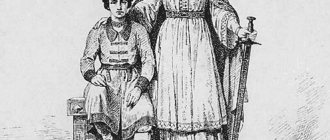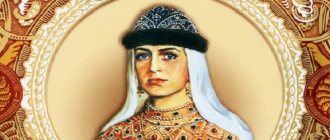At this time, Grand Duchess Olga was raising her son Svyatoslav, who, after Igor’s death, could lay claim to the throne, but was still too young. Voivode Asmud took charge of young Svyatoslav. The princess herself took up state affairs. In the fight against the Drevlyans and other external enemies, she had to rely on her own cunning and prove to everyone that the country, which had previously been ruled only by the sword, could be ruled by a woman’s hand.
Baptism of Grand Duchess Olga
Grand Duchess Olga became the first ruler of Kievan Rus to accept the Christian faith. It is interesting that after her baptism the princely squad and all the people remained pagans. Even the son of the future saint, the Grand Duke of Kiev Svyatoslav Igorevich, was not a Christian.
As The Tale of Bygone Years says, Olga was baptized in 957 in the capital of Byzantium - Constantinople. She went there, entrusting Kyiv to her son Svyatoslav, who by that time had grown up and could rule the state. In Constantinople, Emperor Constantine VII Porphyrogenitus and Patriarch Theophylact of Constantinople baptized the Russian princess personally: “And she was given the name Elena in baptism, just like the ancient queen-mother of Emperor Constantine I.” The Patriarch admonished Olga with the words: “Blessed are you among the Russian women, for you left darkness and loved the Light. The Russian people will bless you in all future generations, from your grandchildren and great-grandchildren to your most distant descendants.”
There are other versions of who, when and under what political circumstances baptized Grand Duchess Olga. One thing is certain - it happened in the capital of Byzantium. The ruler returned to Kyiv as a Christian.
Life of a princess
The future saint and grand duchess was born around 890. Her name - Olga - was the Russian version of the Scandinavian name Helga, which translates as “bright”, “sacred”. She was a simple, unfamous girl, although she came from a forgotten family of Izborsk princes.
Princess Olga's husband was Prince Igor of Kiev, whom she accidentally met on the banks of a river in the Pskov land. Princess Olga ascended the Kiev throne after Prince Igor was killed by the Drevlyans. She ruled for seventeen years - from 945 to 962. Olga had a son - Grand Duke Svyatoslav Igorevich.
Iconography of the Holy Equal-to-the-Apostles Grand Duchess Olga
The iconography of Grand Duchess Olga is traditional for all saints equal to the apostles. Equal to the Apostles are those saints who served the Lord, enlightening people with the light of Christ. For example (if we are talking about holy princes and kings), they converted to Christianity the citizens of the country in which they reigned. These saints are likened to the apostles - for spreading the Gospel. This is Saint Mary Magdalene; and Emperor Constantine and his mother Queen Helena; and Prince Vladimir, who baptized Rus'; and Saint Nina, the enlightener of Georgia; and Grand Duchess Olga.
Equal to the Apostles Olga is traditionally depicted standing on icons. In her right hand is a cross, a symbol of the preaching of Christ, which was preached by all the saints equal to the apostles. In the left hand is a symbolic image of the temple.
Another traditional image of Saint Olga - together with Equal-to-the-Apostles Prince Vladimir.
Holy Princess Olga (life, images, monuments)
The author of the “Book of Degrees” writes: “Her (Olga’s) feat was that she recognized the true God. Not knowing the Christian law, she lived a pure and chaste life, and she wanted to be a Christian by free will, with the eyes of her heart she found the path of knowing God and followed it without hesitation.” The Rev. Nestor the Chronicler narrates: “Blessed Olga from an early age sought wisdom, which is the best in this world, and found a pearl of great value—Christ.” Mikhail Nesterov. Holy Equal-to-the-Apostles Princess Olga (1927)
Having made her choice, Grand Duchess Olga, entrusting Kyiv to her grown-up son, sets off with a large fleet to Constantinople. Old Russian chroniclers will call this act of Olga “walking”; it combined a religious pilgrimage, a diplomatic mission, and a demonstration of the military power of Rus'. “Olga wanted to go to the Greeks herself in order to look at the Christian service with her own eyes and be fully convinced of their teaching about the true God,” the life of Saint Olga narrates. According to the chronicle, in Constantinople Olga decides to become a Christian. The sacrament of Baptism was performed on her by Patriarch Theophylact of Constantinople (933 - 956), and the successor was Emperor Constantine Porphyrogenitus (912 - 959), who left a detailed description of the ceremonies during Olga’s stay in Constantinople in his essay “On the Ceremonies of the Byzantine Court”. The Patriarch blessed the newly baptized Russian princess with a cross carved from a single piece of the Life-Giving Tree of the Lord. On the cross there was an inscription: “The Russian land was renewed with the Holy Cross, and Olga, the blessed princess, accepted it.”
Sergey Kirillov. Duchess Olga. Baptism. The first part of the triptych “Holy Rus'”
Olga returned to Kyiv with icons and liturgical books—her apostolic service began. She erected a temple in the name of St. Nicholas over the grave of Askold, the first Christian prince of Kyiv, and converted many Kiev residents to Christ. The princess set off to the north to preach the faith. In the Kyiv and Pskov lands, in remote villages, at crossroads, she erected crosses, destroying pagan idols.
Saint Olga laid the foundation for special veneration of the Most Holy Trinity in Rus'. From century to century, a story was passed down about a vision she had near the Velikaya River, not far from her native village. She saw “three bright rays” descending from the sky from the east. Addressing her companions, who were witnesses to the vision, Olga said prophetically: “Let it be known to you that by the will of God in this place there will be a church in the name of the Most Holy and Life-Giving Trinity and there will be a great and glorious city here, abounding in everything.” At this place Olga erected a cross and founded a temple in the name of the Holy Trinity. It became the main cathedral of Pskov, the glorious Russian city, which has since been called the “House of the Holy Trinity.” Through mysterious ways of spiritual succession, after four centuries, this veneration was transferred to St. Sergius of Radonezh.
Svyatoslav Roerich. Roses of the heart. Duchess Olga
On May 11, 960, the Church of St. Sophia, the Wisdom of God, was consecrated in Kyiv. This day was celebrated in the Russian Church as a special holiday. The main shrine of the temple was the cross that Olga received at baptism in Constantinople. The temple built by Olga burned down in 1017, and in its place Yaroslav the Wise erected the Church of the Holy Great Martyr Irene, and moved the shrines of the St. Sophia Olga Church to the still standing stone Church of St. Sophia of Kiev, founded in 1017 and consecrated around 1030. In the Prologue of the 13th century, it is said about Olga’s cross: “It now stands in Kyiv in St. Sophia in the altar on the right side.” After the conquest of Kyiv by the Lithuanians, Holga's cross was stolen from St. Sophia Cathedral and taken by Catholics to Lublin. His further fate is unknown to us. The apostolic labors of the princess met secret and open resistance from the pagans. Among the boyars and warriors in Kyiv there were many people who, according to the chroniclers, “hated Wisdom,” like Saint Olga, who built temples for Her. The zealots of pagan antiquity raised their heads more and more boldly, looking with hope at the growing Svyatoslav, who decisively rejected his mother’s entreaties to accept Christianity. “The Tale of Bygone Years” tells about it this way: “Olga lived with her son Svyatoslav, and persuaded his mother to be baptized, but he neglected this and covered his ears; however, if someone wanted to be baptized, he did not forbid him, nor mocked him... Olga often said: “My son, I have come to know God and I rejoice; so you, if you know it, you will also begin to rejoice.” He, not listening to this, said: “How can I want to change my faith alone? My warriors will laugh at this!” She told him: “If you are baptized, everyone will do the same.” He, without listening to his mother, lived according to pagan customs. Saint Olga had to endure many sorrows at the end of her life. The son finally moved to Pereyaslavets on the Danube. While in Kyiv, she taught her grandchildren, the children of Svyatoslav, the Christian faith, but did not dare to baptize them, fearing the wrath of her son. In addition, he hindered her attempts to establish Christianity in Rus'. In recent years, amid the triumph of paganism, she, once the universally revered mistress of the state, baptized by the Ecumenical Patriarch in the capital of Orthodoxy, had to secretly keep a priest with her so as not to cause a new outbreak of anti-Christian sentiment. In 968, Kyiv was besieged by the Pechenegs. The holy princess and her grandchildren, among whom was Prince Vladimir, found themselves in mortal danger. When news of the siege reached Svyatoslav, he rushed to the rescue, and the Pechenegs were put to flight. Saint Olga, already seriously ill, asked her son not to leave until her death. She did not lose hope of turning her son’s heart to God and on her deathbed did not stop preaching: “Why are you leaving me, my son, and where are you going? When looking for someone else's, to whom do you entrust yours? After all, Your children are still small, and I am already old, and sick, - I expect an imminent death - departure to my beloved Christ, in whom I believe; Now I don’t worry about anything except about you: I regret that although I taught a lot and convinced you to leave the wickedness of idols, to believe in the true God, known to me, but you neglect this, and I know what for your disobedience A bad end awaits you on earth, and after death - eternal torment prepared for the pagans. Now fulfill at least this last request of mine: do not go anywhere until I am dead and buried; then go wherever you want. After my death, do not do anything that pagan custom requires in such cases; but let my presbyter and the clergy bury my body according to Christian custom; do not dare to pour a grave mound over me and hold funeral feasts; but send the gold to Constantinople to the Holy Patriarch, so that he may make a prayer and offering to God for my soul and distribute alms to the poor.” “Hearing this, Svyatoslav wept bitterly and promised to fulfill everything she bequeathed, refusing only to accept the holy faith. On July 11, 969, Saint Olga died, “and her son and grandchildren and all the people cried for her with great lamentation.” Presbyter Gregory fulfilled her will exactly. Saint Olga Equal to the Apostles was canonized at a council in 1547, which confirmed her widespread veneration in Rus' even in the pre-Mongol era. Saint Olga, Equal to the Apostles, became the spiritual mother of the Russian people, through her their enlightenment with the light of the Christian faith began.
The pagan name Olga corresponds to the masculine Oleg (Helgi), which means “holy.” Although the pagan understanding of holiness differs from the Christian one, it presupposes in a person a special spiritual attitude, chastity and sobriety, intelligence and insight. Revealing the spiritual meaning of this name, the people called Oleg Prophetic, and Olga - Wise. Subsequently, Saint Olga will be called Bogomudra, emphasizing her main gift, which became the basis of the entire ladder of holiness for Russian wives - wisdom. The Christian name of Saint Olga - Helen (translated from ancient Greek as “Torch”), became an expression of the burning of her spirit. Saint Olga (Elena) received a spiritual fire that did not go out throughout the thousand-year history of Christian Russia.
John the Baptist and Saint Olga
Monument to Princess Olga in Kyiv
Another monument to Princess Olga in Kyiv
Monument to Princess Olga in Pskov
It is noteworthy that the residents of the Ukrainian city of Korosten (the modern name of Iskorosten) long ago forgave Princess Olga for burning their city. Now in Korosten there is a monument to the holy princess Olga.
In preparing the article, materials from the site pravoslavie.ru were used.
Prayers to the Holy Equal-to-the-Apostles Grand Duchess Olga
1.
O holy Equal-to-the-Apostles Grand Duchess Olgo, the first saint of Russia, a warm intercessor and prayer book for us before God. We resort to you with faith and pray with love: be your helper and accomplice in everything for our good, and just as in temporal life you tried to enlighten our forefathers with the light of the holy faith and instruct me to do the will of the Lord, so now, in the heavenly lordship, favorable With your prayers to God, help us in enlightening our minds and hearts with the light of the Gospel of Christ, so that we may advance in faith, piety and love of Christ. In poverty and sorrow, give comfort to the needy, give a helping hand to those in need, stand up for those who are offended and mistreated, those who have gone astray from the right faith and are blinded by heresies, and ask us from the all-generous God for all that is good and useful in temporal and eternal life, so that having lived well here, we will be worthy of an inheritance eternal blessings in the endless Kingdom of Christ our God, to Him, together with the Father and the Holy Spirit, belongs all glory, honor and worship, always, now and ever, and unto the ages of ages. Amen.
2.
O holy Equal-to-the-Apostles Princess Olgo, accept praise from us, unworthy servants of God (names), before your honest icon, praying and humbly asking: protect us with your prayers and intercession from misfortunes and troubles, and sorrows, and fierce sins; We will also be delivered from future torments by honestly creating your holy memory and glorifying God, glorified in the Holy Trinity, the Father and the Son and the Holy Spirit, now and ever and unto the ages of ages.
3.
O great saint of God, God-chosen and God-glorified, equal to the apostles Grand Duchess Olgo! You rejected pagan evil and wickedness, you believed in the One True Trinitarian God and you accepted holy baptism and laid the foundation for the enlightenment of the Russian land with the light of faith and piety. You are our spiritual ancestor, you, according to Christ our Savior, are the first culprit of the enlightenment and salvation of our race. You are a warm prayer book and intercessor for the kingdom of all Russia, for its kings, rulers, the army and for all people. For this reason, we humbly pray to you: look at our weaknesses and beg the most merciful King of Heaven, so that He will not be angry with us, as through our weaknesses we sin all day long, and may He not destroy us with our iniquities, but may He have mercy and save us in His mercy, may He implant His saving fear in our hearts, may He enlighten our minds with His grace, so that we understand the ways of the Lord, leave the paths of wickedness and error, and strive in the paths of salvation and truth, the unwavering fulfillment of the commandments of God and the statutes of the Holy Church. Pray, blessed Olgo, to God, the Lover of Mankind, to add His great mercy to us: may he deliver us from the invasion of foreigners, from internal disorder, rebellion and strife, from famine, deadly diseases and from all evil; may he give us the goodness of the air and the fruitfulness of the earth, may he give the shepherds zeal for the salvation of their flock, may all people hasten to diligently correct their services, may they have love among themselves and like-mindedness, may they strive faithfully for the good of the Fatherland and the Holy Church, may the light of saving faith in Our Fatherland, in all its ends; may unbelievers turn to faith, may all heresies and schisms be abolished; Yes, having lived in peace on earth, we will be worthy of eternal bliss in heaven, praising and exalting God forever and ever. Amen.
Images from the Radziwill Chronicle, late 15th century
Olga's reception of the Drevlyan ambassadors, who offered her, after the murder of Igor, to become the wife of the Drevlyan prince Mal.
The departure of the Drevlyan ambassadors after a conversation with Olga; Olga's order to punish the ambassadors
Olga’s first revenge for the murder of Igor: the burial of the Drevlyan ambassadors sitting in the boat alive in a deep hole.
Olga’s second revenge for the murder of Igor: the burning of the newly arrived Drevlyan ambassadors in the bathhouse.
Olga's cry over Igor's coffin; the creation, at her command, of a large mound over Igor’s grave.
Olga's third revenge for the murder of Igor: plentiful treatment of the Drevlyan warriors with wine and reprisal against them.
The battle of the troops of Olga and Svyatoslav Igorevich with the army of the Drevlyans; defeat of the Drevlyans and their flight to their cities.
Collection of birds by the Drevlyans; offering tribute to Olga, three doves and three sparrows from the yard.
Olga's fourth revenge for the murder of Igor: burning of the Drevlyan city of Iskorostsnya with the help of birds, reprisal against its population.
The reign of Olga with Svyatoslav Igorevich in Kyiv.
Olga’s establishment of graveyards and imposition of tribute on the population throughout the land; reign of Olga and Svyatoslav Igorevich in Kyiv.
Olga’s refusal of the offer of the Byzantine Emperor Constantine Porphyrogenitus to become his wife; offering Olga royal gifts.
Blessing of Olga by the Byzantine Patriarch; Olga's sailing from Constantinople to Kyiv
Olga's reception of the ambassadors of the Byzantine Emperor Constantine Porphyrogenitus; the departure of ambassadors from Kyiv after Olga’s refusal of the emperor’s request for reciprocal gifts.
Olga's persuasion of her son Svyatoslav Igorevich to accept Christianity; Olga's prayers for the well-being of her son and her subjects.
The flight of the Pechenegs, frightened by the possibility of the arrival of Svyatoslav Igorevich with his squad; Olga's meeting with her grandchildren and close people on the banks of the Dnieper of the squad in boats that arrived to help.
Olga's message to Svyatoslav Igorevich about the Pecheneg invasion of Russian lands; Svyatoslav's return to Kyiv and his meeting with Olga, children and the population.
Death, mourning and burial of Olga.
Death and glorification as saints
The Grand Duchess of Kiev ended her life from old age and illness, and not from the treacherous machinations of the enemy. Besieged by the Pechenegs in Kyiv, Olga sent a messenger to her son, who was on a campaign. Having returned with his troops and defeated the barbarians, Svyatoslav was forced to stay and replace his mother on the princely throne, as she told about his approaching death. Equal to the Apostles Olga departed to the Lord on July 11, 969 in her bed. Contemporaries claim that her body remained incorrupt for a long time.
Later, the princess was canonized as a saint. It is not known for certain what Olga looked like during her lifetime, but if you believe the descriptions of chroniclers and contemporaries, she had an unearthly beauty. Modern scientists have managed to create an approximate portrait of her by studying the relics of the saint.
Based on the facts of the activities and reign of Princess Olga, we can confidently say that she was a strong, intelligent and wise ruler. The important reforms it carried out gave the country rapid development in many directions and sectors. Interesting facts from her life also confirm this, and her efforts to establish Christianity nullify all the unpleasant points in the princess’s biography for modern history. The ruler left her bright mark in completely different areas, including:
- policy;
- religion;
- culture.
Many books have been written about the life of the Kyiv princess and many documentaries and feature films have been shot, characterizing her both as a person and as a ruler. Spiritual works dedicated to the saint have also been published. Here is just a small part of where Equal-to-the-Apostles Olga is mentioned:
- ballet "Olga";
- film "Prince Vladimir";
- book by Oleg Panus “United by Power”;
- Boris Vasiliev's book "Olga, Queen of the Rus."
Historians and the church unanimously recognize that the reign of the princess brought the people of Kievan Rus to a new stage of development, and the historical trip to Byzantium, where Olga decided to be baptized, marked the beginning of the adoption of Christianity by the Russian people.
In short, the outcome of her reign influenced the strengthening of statehood, external relations and religious life.
Facts about the princess's character
The trends, culture and traditions of that time did not allow the rulers to be boneless and soft-bodied. The harsh pagan rules and way of life gave birth to persistent and cruel people who did not take into account the lives and interests of their opponents. But the princess a priori was not weak-willed and helpless, because life hardened her and taught her a lot even before she was given the reins of government.
Fearing for the life of her child, who could be killed either by pretenders to the throne or by the Drevlyans who wanted to behead their inveterate and stronger enemy - Kievan Rus, the princess acted quickly and calmly, showing all the strength of her character, and sometimes even cruelty. But no one could be surprised by bloodthirstiness in those days. Guided by the right of blood feud, which was supported by the traditions of this era, Olga carried out her cunning plan .
The Drevlyans, taking advantage of the death of Prince Igor, sent messengers to Olga with a wedding proposal. This was supposed to end the eternal enmity between the two lands, but the new ruler and grief-stricken widow decided to take revenge for her husband. She received the matchmakers with honor, without allowing them to suspect anything. Having lulled the guests' vigilance, she ordered them to be captured and buried alive along with the boat on which they arrived. The princess wanted to show the Drevlyans that revenge for their murdered husband would be much more terrible and painful.
But this was only a small part of what was planned. Having dealt with the first envoys, Olga sent a messenger to the enemy’s camp demanding that they send her suitable matchmakers. In response, the Drevlyans sent their best men to the capital of Rus' in order to express recognition of the queen. The guests were received in the city with honors. Those who arrived were sent to the bathhouse before the princess's reception, where they were locked and burned alive. Thus, the newly-made ruler deprived her enemy of his best representatives and strongest warriors.









